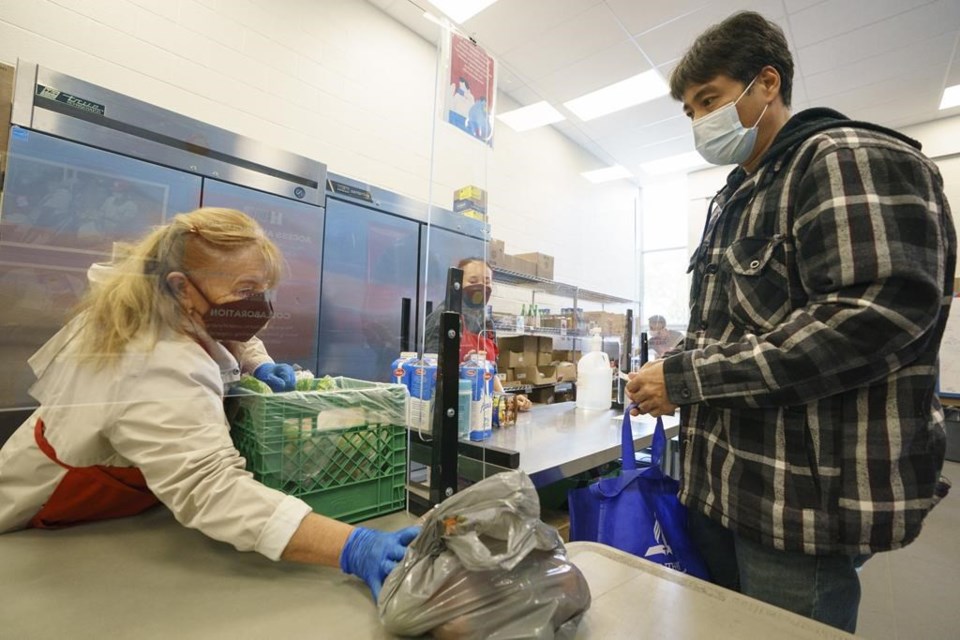TORONTO — Simon Malsi hopes to pick up a few extra hours of work on Thanksgiving Day to help him afford to put a holiday meal on the table.
The personal support worker said he's been trying to secure more shifts to make ends meet as his family strains to keep up with the soaring cost of living in north Toronto.
Even with his wife's part-time wages, Malsi said rent, gas and groceries have become so expensive that it's a struggle to keep his two-year-old son and five-year-old daughter well fed.
There are plenty of other families in the same position this holiday season, say food bank workers, as staggering inflation rates drive up demand for their services while diminishing the buying power of their donation dollars.
Malsi turned up at the North York Harvest Food Bank for the first time Tuesday with a plaid plastic bag as volunteers helped him pick out items from the shelves.
For a family of four, a standard haul might include four packs of instant dry noodles, a jar of peanut butter, two cans of tuna, two bags of lentils, two packs of spaghetti, a carton of milk, a box of yogurt, a smattering of fresh vegetables and a few other staples.
The supplies are meant to last three days, but many families stretch them out for longer.
Malsi said he hopes the supplemental food may leave enough room in his budget to buy a barbecued chicken for Thanksgiving dinner.
"It's very good we have (this resource). You can help needy people like me," Malsi said. "We need other sources."
North York Harvest Food Bank is among a number of organizations across the country that have reported a steady influx of new users since the start of the COVID-19 pandemic.
Last year, 3,500 families visited the network for the first time, said Henry Chiu, director of development and marketing. He expects that number could continue to rise amid deepening concern about a looming recession.
So far, the community has stepped up their generosity to meet the heightened need, said Chiu.
The food bank primarily relies on financial donations to support its "choice" model, which similar to a grocery store, allows users to pick their own food from a variety of available options.
This bulk purchasing power has cushioned the blow of climbing food costs, said Chiu, while also allowing clients to tailor their selections to their dietary needs and restrictions.
Still, he said, the organization is feeling the crunch across many aspects of its operation, including the increased expense of fuelling its fleet of trucks.
North York Harvest Food Bank tends to see a spike in donations around the holidays, Chiu noted, and he worries about a potential drop-off when the season of giving ends, particularly if swelling costs cut into donors' chequebooks.
As financial stress mounts, he said, Canada needs to look beyond short-term fixes to address the systemic causes of food insecurity, such as lack of access to affordable housing.
"A food bank is a necessary but only a Band-Aid solution," said Chiu. "We need to have a more robust social support network."
Meanwhile, some food banks say their grocery bills have ballooned as they work to feed more people with fundraising dollars that don't go as far as they used to.
In 2019, the Calgary Food Bank's budget for food purchases was $1.7 million, said communications co-ordinator Betty Jo Kaiser.
The organization previously projected it would spend $2.4 million on emergency food hampers in 2022, she said. Now, that estimate has nearly doubled to around $4.5 million.
"We're feeding thousands of people a week right now .... That's what we're working on day in, day out," Kaiser said. "To picture something worse down the line is not possible for me in this moment, because the immediate demand is so massive."
The Allan Gardens Food Bank in downtown Toronto is also straining under the duelling pressures of increased demand and inflated food costs, said president Meryl Wharton.
Still, the group is hoping a last-minute gift will allow them to do something special for the 900 clients they're expecting this week.
Before COVID-19, the food bank used to serve turkey or whole chicken for Thanksgiving, said Wharton. Now, they're waiting to see if a donation will come through in time to add poultry to the menu, he said.
At the very least, he said, the food bank will do what it can to make sure no one goes without a holiday meal.
"We always make sure the clients get something," Wharton said.
This report by The Canadian Press was first published Oct. 6, 2022.
Adina Bresge, The Canadian Press


